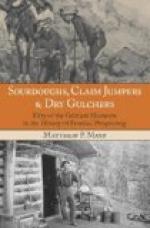It was, as he had anticipated, nearly flat. Under the pine branch, which might make a very good chair back, grew a thick cushion of moss. The one tree broke the freedom of the eye’s sweep toward the west, but in all other directions it was uninterrupted. As the girl had said, the tops of pines alone met the view, miles on miles of them, undulating, rising, swelling, breaking against the barrier of a dike, or lapping the foot of a great round boulder-mountain. Here and there a darker spot suggested a break for a mountain peak; rarely a fleck of white marked a mountain road. Back of them all—ridge, mountain, cavernous valley—towered old Harney, sun-browned, rock-diademed, a few wisps of cloud streaming down the wind from his brow, locks heavy with the age of the great Manitou whom he was supposed to represent. Eastward, the prairie like a peaceful sea. Above, the alert sky of the west. And through all the air a humming—vast, murmurous, swelling—as the mountain breeze touched simultaneously with strong hand the chords, not of one, but a thousand pine harps.
Bennington drew in a deep breath, and looked about in all directions. The girl watched him.
“Ah! it is beautiful!” he murmured at last with a half sigh, and looked again.
She seized his hand eagerly.
“Oh, I’m so glad you said that—and no more than that!” she cried. “I feel the sun fairy can make you welcome now.”
CHAPTER V
THE SPIRIT MOUNTAIN
“From now on,” said the girl, shaking out her skirts before sitting down, “I am going to be a mystery.”
“You are already,” replied Bennington, for the first time aware that such was the fact.
“No fencing. I have a plain business proposition to make. You and I are going to be great friends. I can see that now.”
“I hope so.”
“And you, being a—well, an open-minded young man” (Now what does she mean by that? thought Bennington), “will be asking all about myself. I am going to tell you nothing. I am going to be a mystery.”
“I’m sure——”
“No, you’re not sure of anything, young man. Now I’ll tell you this: that I am living down the gulch with my people.”
“I know—Mr. Lawton’s.”
She looked at him a moment. “Exactly. If you were to walk straight ahead—not out in the air, of course—you could see the roof of the house. Now, after we know each other better, the natural thing for you to do will be to come and see me at my house, won’t it?”
Bennington agreed that it would.
“Well, you mustn’t.”
Bennington expressed his astonishment.
“I will explain a very little. In a month occurs the Pioneer’s Picnic at Rapid. You don’t know what the Pioneer’s Picnic is? Ignorant boy! It’s our most important event of the year. Well, until that time I am going to try an experiment. I am going to see if—well, I’ll tell you; I am going to try an experiment on a man, and the man is you, and I’ll explain the whole thing to you after the Pioneer’s Picnic, and not a moment before. Aren’t you curious?”




